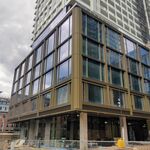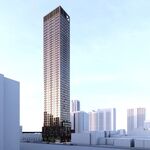interested
Senior Member
CDR, I think we are saying the same thing.
Either 1-5 years old or 20 years old, well run and with good reserve fund.
Either 1-5 years old or 20 years old, well run and with good reserve fund.
Problem with 20 yr old is features and finishes and energy efficiency that usually translates into a much higher maint fee which will always hinder value moving forward. Look at Bay St for ex. College Park commanding $600s per sq ft and 20 yr old tower on same block on Bay at $450 and has not appreciated much over the years.
New is always in demand in key locations.
Whats the maint fee is scares buyers in the 20 yr old comparable
Sigh, I'm not going to argue with any of you, but as I stated before, if you can purchase a property and break even and hold it, you generate wealth by fulfilling someone's need for a roof over their head. This is how virtually all RE investors have made their money. The flippers, the few, have made money off fool's back, but as we've seen during the last few collapses the vast majority of them are bankrupt and, a significant portion, homeless and living rough.
If you purchase property blindly in the hopes of generating wealth by signing a few cheques without realizing the risks you are taking on, you deserve every little thing coming towards you, and more. See how Americans treat underwater 'homeowners'-- 'Morons' would be a quite common term. No sympathy for being a fool and buying a brick tomb and enslaving yourself for 35 years.
Anyways, people have to realize that real estate in the long term matches inflation. Appreciations and depreciations are the result of booms and busts in RE cycles, which are very, very well documented. Wealthy individuals purchase hard assets, ie real estate, as a store of wealth because even in times of inflation, the biggest risk factor to maintaining generational wealth, housing holds its value.
When you purchase RE at a 0-7% downpayment, you are not investing in real estate-- you are speculating in a highly, highly leveraged futures trade. The bank will gladly take the other leg of that trade, considering it's literally of no risk to them (thanks to the CMHC).
As far as the RBC 'housing affordability index' goes, if you read that and got a warm and fuzzy feeling, and coincidentally felt bullish about 'investing' in RE, then you are a fool. RBC is the biggest mortgage lender in Canada. They want you to buy property, because they make ridiculous profits with no risk to them. Furthermore, that index should scare the hell out of you, because that's pretax income. The average house in Toronto costs, what, 550k? And requires an income of 120k? Yet it consumes 55% of pre-tax income. At 120k, your taxes are 30k. So out of your monthly disposable income of 7,000, you're paying 5,500 a month for housing. Leaving you 1,500 for child care, car insurance, car lease payments, gas, food, clothing, laundry, cell phone, tv, RRSP's, etc.
In Vancouver, it takes up 70% of pre-tax income, and an average house requires 150k. Post-tax, you're taking home 103k in BC. That's 8,500 a month post-tax. Yet housing costs are........ $8,750?
But if you were reading carefully, you'd have realized I was using the minimum qualifying income instead of the average. Good catch. But now, let me ask you this, how are these people getting these mortgages, when the banks themselves have a limit of a 32% debt-to-income ratio? And besides, the ratios are relatively the same for my considerations... housing costs are now virtually 100% of take-home pay.
That is the scariest part. People are in over their heads, and a little rise in interest rates or a tanking economy (and more unemployed) will absolutely devastate Canadian RE & the Canadian economy...
If you want to generate wealth, help accelerate the bubble, and short Canadian RE. It can be done (I'm doing it as we speak).
I'll hazard a few guesses. New because it goes up more and costs more means that it likely will lose more.
That said, a building must be maintained, if not, in a down market, it will be unsellable. I think you are safer with slighly new, by this I mean a building perhaps 2-5 years old for a few years. Unlikely to have major expenses, still modern, and the new premium for future growth should be out of the price.
Location is always important. So desirable areas will decrease less I would believe.
On the other hand, a 20 year old building has expenses but if good reserve fund and well run/maintained, you get good value and have protection on the downside.
At least that would be my guess.
Hope this helps.
Good luck Cate.
Well balanced discussion guys - thank you.
I'm curious papperchopper, how exactly are you shorting Cdn RE? Short the builders, Inc trusts (can that be done?). I didn't think that a US style credit default swap mechanism process existed in this county. Nor do city "housing indices". Please correct me if I'm wrong.
Perhaps this is also a question well-suited for urbandreamer's expert input.
Best - Cate
Thanks interested.
Interesting that you should mention this. Brad Lamb seems to have a habit of buying to live (mainly his own developments), then sells and buys another to live - just about at the "expiry" of the future premium. To my knowledge, he has done this (at least) 3 times.
Yes, what has worked to date has been buy on paper: then prices increase. Move in therefore solidfying your gains as your principal residence,.
You are correct and despite what everyone says about him: good or bad, I know Brad Lamb. He in fact was my agent (when he still did such mundane tasks) and showed me the buildings in downtown that were good 16 years ago. Of all the real estate agents I have met, and I have met many in the past, I will grant him he was the best, most straight talking and most informed agent I have dealt with. We were done in 2 outings having boiled it down to 5 buildings and 8 units. Done in 2 days and to this day I do admire that.
Forgive me - I have some very stupid questions. My apologies if this subject belongs elsewhere on the forum (where?)
I am trying to assess the probability of the % differential in bubble decline (assuming it occurs/continues) between pre cons, new(er) builds, and older buildings (say 10+yrs).
If I need to buy to live and want to minimize my downside risk, which of the above 3 options would decline the least? And why?
For "older" buildings in desirable d/t core nabes, what kind of difference should I reasonably expect to see in a building which has maintained its CAPX vs. one whose maintenance has been neglected.
Am I better off purchasing older, well maintained resale? How well do older condos maintain their value, and what's/when's the optimal bailout exit strategy?
Many thanks - Cate
Problem with 20 yr old is features and finishes and energy efficiency that usually translates into a much higher maint fee which will always hinder value moving forward. Look at Bay St for ex. College Park commanding $600s per sq ft and 20 yr old tower on same block on Bay at $450 and has not appreciated much over the years.
New is always in demand in key locations.
Whats the maint fee is scares buyers in the 20 yr old comparable
It's 99% about the principal residence exemption.
Sounds like a better deal for him that you- 2 days and his client finds a property and he collects a 2.5% commission. Not bad. Most agents have to spend weeks or months looking diligently for their buyers.
In my limited experience with his office (not him personally) I found the firm to be the most unethical residential real estate agency that I have come across in Ontario. Other provinces have much lower standards I find. I'm sure it starts from the top down.
More self-serving rhetoric from the ridiculously conflicted industry talking head.
George, from now on you should add a disclaimer to your signature:
"Please note: I derive the bulk of my income from selling pre-construction condos. Have a nice day."
Easy. Buy into a condo that is predominantly owner occupied and you will see the best value retention. This is exactly what happened in Florida after the crash. Owner occupied buildings only dropped 20%-25% instead of 40%-50%.




